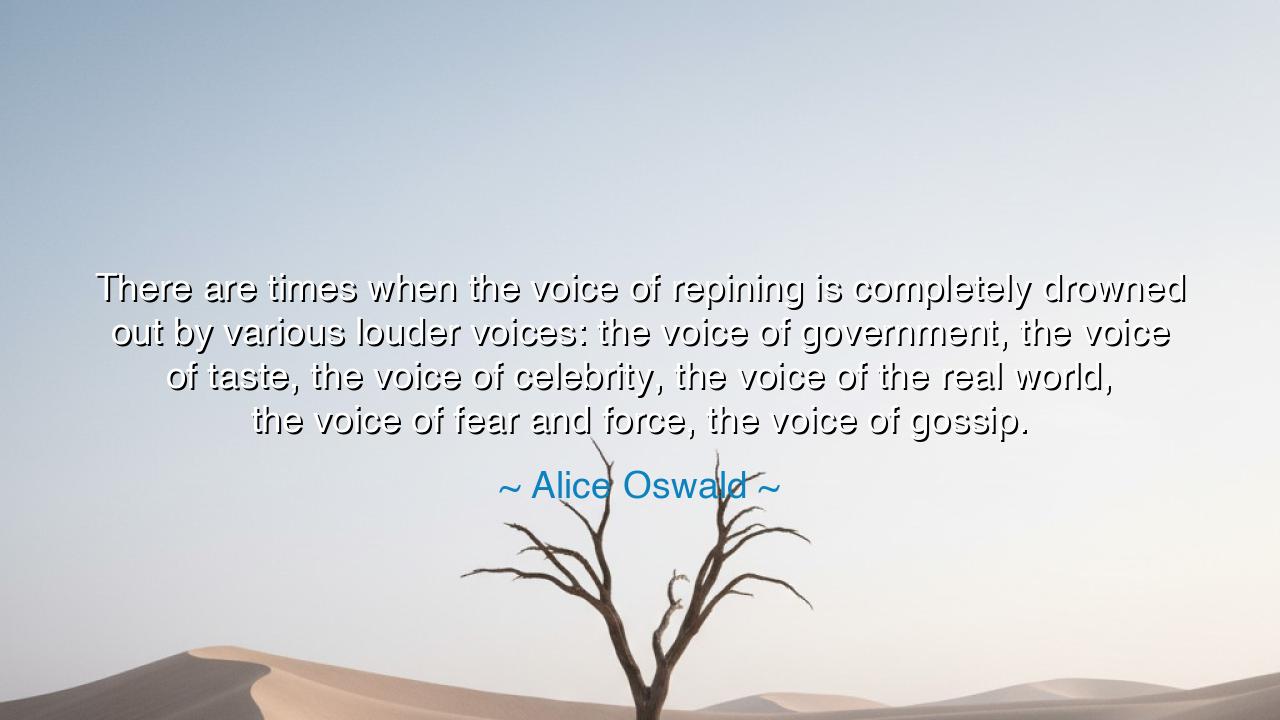
There are times when the voice of repining is completely drowned
There are times when the voice of repining is completely drowned out by various louder voices: the voice of government, the voice of taste, the voice of celebrity, the voice of the real world, the voice of fear and force, the voice of gossip.






“There are times when the voice of repining is completely drowned out by various louder voices: the voice of government, the voice of taste, the voice of celebrity, the voice of the real world, the voice of fear and force, the voice of gossip.” Thus spoke Alice Oswald, a poet of quiet waters and ancient echoes, who understood that the most fragile thing in the world is often the most precious — the inner voice, the soft murmur of conscience and sorrow that whispers truth beneath the roar of the world. Her words are not a complaint, but a lament — a cry for silence in an age of noise, for reflection in an age of reaction.
In her wisdom, Oswald names the powers that seek to drown the soul: the voice of government, commanding and cold; the voice of taste, dictating what is beautiful and what is not; the voice of celebrity, glittering but hollow; the voice of the real world, insisting that only what can be measured is real; the voice of fear and force, which bends the weak to the will of the strong; and the voice of gossip, that endless whisper that feeds upon the lives of others. These are the tyrants of the modern age, not with swords or chains, but with distraction and noise. Against them stands the quiet spirit — that part of us which feels, grieves, doubts, and wonders. When that spirit is silenced, humanity itself begins to fade.
From the dawn of history, the great souls have always struggled to preserve the inner voice amid the clamor of the crowd. Recall the story of Socrates, who stood before the might of Athens, accused of corrupting youth and questioning the gods. Around him thundered the voices of law, opinion, and fear. Yet he listened not to them, but to his daimonion — that quiet inner guide that spoke only to him. It was the whisper of conscience amid the storm. And though the city condemned him, his silence at death became louder than all their cries. From his calm obedience to truth was born a lesson eternal: that the voice of the soul must not be traded for the approval of the world.
But in every age, the battle renews itself. Today, the voices of noise have multiplied — not from a single square, but from every screen and street. The voice of celebrity tells us what to value; the voice of gossip consumes our attention; the voice of fear and force keeps us obedient to the shifting winds of power. Few pause to hear the voice of repining — the sorrow that warns us of what we have lost, the yearning that reminds us we are human. For it is through mourning that the heart stays alive, and through stillness that truth is heard. The tragedy of our time is not that we have no voices, but that we have too many — and none that we truly trust.
Yet Oswald’s wisdom is not despair, but guidance. She reminds us that silence is a sacred act of rebellion. To withdraw from the noise is not cowardice — it is courage. To listen, truly listen, to one’s own voice is to reclaim the power that noise has stolen. The poet, the artist, the thinker, the dreamer — these are the keepers of the quiet flame. They hear what others cannot, and in their solitude they restore what the multitude forgets. When the voice of government commands, they recall justice; when the voice of taste mocks, they defend beauty; when the voice of fear threatens, they speak peace.
Let us then learn to dwell, for a time, in stillness. Seek the spaces where silence breathes — among trees, in art, in honest prayer, or in the solitude of thought. Listen for the voice of repining within yourself — the ache that tells you something sacred is missing. Do not rush to silence it with noise, for it is that ache which leads you back to what is real. Let your sorrow teach you wisdom, and your quiet restore your strength. The world may shout, but you may choose not to answer.
And when you return to the world, return not as one who is carried by its voices, but as one who carries his own. Speak softly, but with purpose; live gently, but with conviction. For the world does not need more noise — it needs more truth, spoken from hearts that have listened deeply. In the end, Oswald’s words are a call to every soul: guard your silence, nurture your sorrow, and never let the world’s loudness drown the whisper that makes you human.






AAdministratorAdministrator
Welcome, honored guests. Please leave a comment, we will respond soon